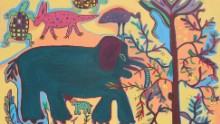After 20,000 years, the world's oldest people face a crisis of culture 隔了兩萬年之後,世界最古老的人民面臨文化危機
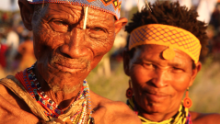
(CNN)-Caught
between modernity and 20,000 years as hunter-gatherers, the San people sit at a
crossroads.
(CNN)-
桑人處在十字路口,身為狩獵原住民,夾在現代化和兩萬年歷史之間。
An
indigenous people in Southern Africa, they are our oldest human ancestors, DNA
testing proving the San are direct descendants of the first Homo sapiens. But
today their culture, traditions and heritage are at risk of being lost forever.
在南非的原住民,是我們最古老的人類祖先,DNA實驗證明桑人是首位現代人的直系後代。但是如今,他們的文化、傳統和遺產陷入永久失傳的危機。
The
San live across South Africa, Botswana, Angola and Namibia. In Botswana they're
known as the Basarwa, where they live a largely nomadic lifestyle that has
remained undisturbed for millennia.
桑人生活在南非、波札那、安哥拉和奈米比亞。在波札那,他們被稱為巴薩爾瓦人,大多過著千年來不被打擾的游牧生活。
"Culture
is something that can die and we should understand that culture is
dynamic," says Bihela Sekere, part of the indigenous population who
previously worked at the Botswana High Commission in London.
「文化是一種會消逝的東西,而我們應該要知道文化是多變的。」同為原住民一份子的Bihela Sekere說道,他先前在倫敦的波札那高級委員會工作。
Sekere
grew up in the Central Kalahari Game Reserve, the second largest of its kind in
the world, hunting as his father had done before him. But in 1997 the
government began removing the Basarwa from the reserve, ostensibly to protect
the area and integrate the community into mainstream society.
Sekere從小在他所屬種族於世界分布第二大的地方–喀拉哈里中央動保區長大、打獵,就像他父親一樣。但是1997年,政府開始將巴薩爾瓦人搬離保護區,宣稱是為了要保護這個區域,讓這個族群融入主流社會。
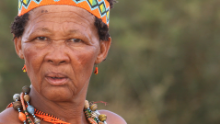
Now
based in a resettlement village, passing on age-old traditions has become
harder and harder for the Basarwa.
現今安置於移民村,對巴薩爾瓦人來說,古老文化的傳承變得更加困難了。
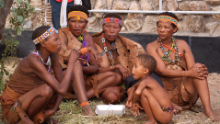
"Some
of the kids, Basarwa kids, are taken to schools (and) they can lose their
culture because they are taught other ways of living," explains Sekere.
"To start with the language -- if they are taught Setswana and English, it
means the language will suffer."
Sekere解釋:「部分被帶到學校的巴薩爾瓦小孩們,因為被教導其他生活方式,他們會因此失去他們的文化。首先是語言,如果他們被教導茨瓦纳語和英語,這意味著其母語受到威脅。」
Sekere
also cites the famous trance dance, a stalwart of Basarwa culture, as something
that could one day suffer at the hands of modern music, played on radios and
mobile phones by youths.
Sekere還以有名的迷咒舞為例,那是巴薩爾瓦的核心文化,是能夠在一天之內毀在年輕人在收音機和手機所播的流行音樂手上。
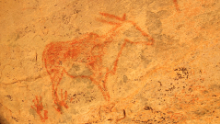
Hope
is not lost, however, while there are those willing to preserve indigenous
culture. Local man Xontae guides the curious around some of his people's
greatest heritage sites, including the Tsodilo Hills, where 4,500 rock
paintings dating back to the Stone Age can be explored. Meanwhile the Kuru
Art Project seeks to revive art making among the Basarwa once more.
然而,還有希望,還有那些願意守護當地文化的人們。當地人Xontae帶著好奇的人們到某些其人民偉大的遺址,其中包括措迪洛山,在那裏可以探索到,追溯至石器時代的4千5百幅石繪畫。同時,庫魯藝術計畫設法再次復興波札那的藝術。
British-Caribbean
artist Ann Gollifer, who is part of the initiative, says that the work the
Basarwa create mainly depicts a hunter-gatherer lifestyle of yesteryear. Using
modern mediums to paint ancient traditions, these artworks have sold all over
the world.
英籍加勒比海藝術家Ann Gollifer是計畫中的一員,她表示波札那人的作品主要是描繪過去狩獵採集的生活型態。用現代的表現手法繪出古老的傳統,這些藝術品將會銷售至全球。
It's
proof that culture is dynamic, malleable and susceptible to change -- for
better or for worse. But with will and determination, the likes of Sekere
believes the Basarwa have what it takes.
這證明了文化是不斷變化的,具有改變的可塑性及善變性,可能更好,也可能更糟。但是憑著意志和決心,有很多像Sekere一樣的人都相信波札那能變得更好。
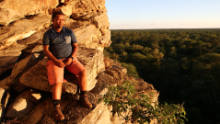
"Culture
on its own, it is what makes you who you are... It's upon us, the youth, to
learn from these old people to promote our culture and to preserve it while
they are still alive."
「文化憑著自己本身,讓你認清自己是誰,它接近著我們年輕的一輩,向老一輩的人學習提倡我們的文化及在他們有生之年維護它。」
